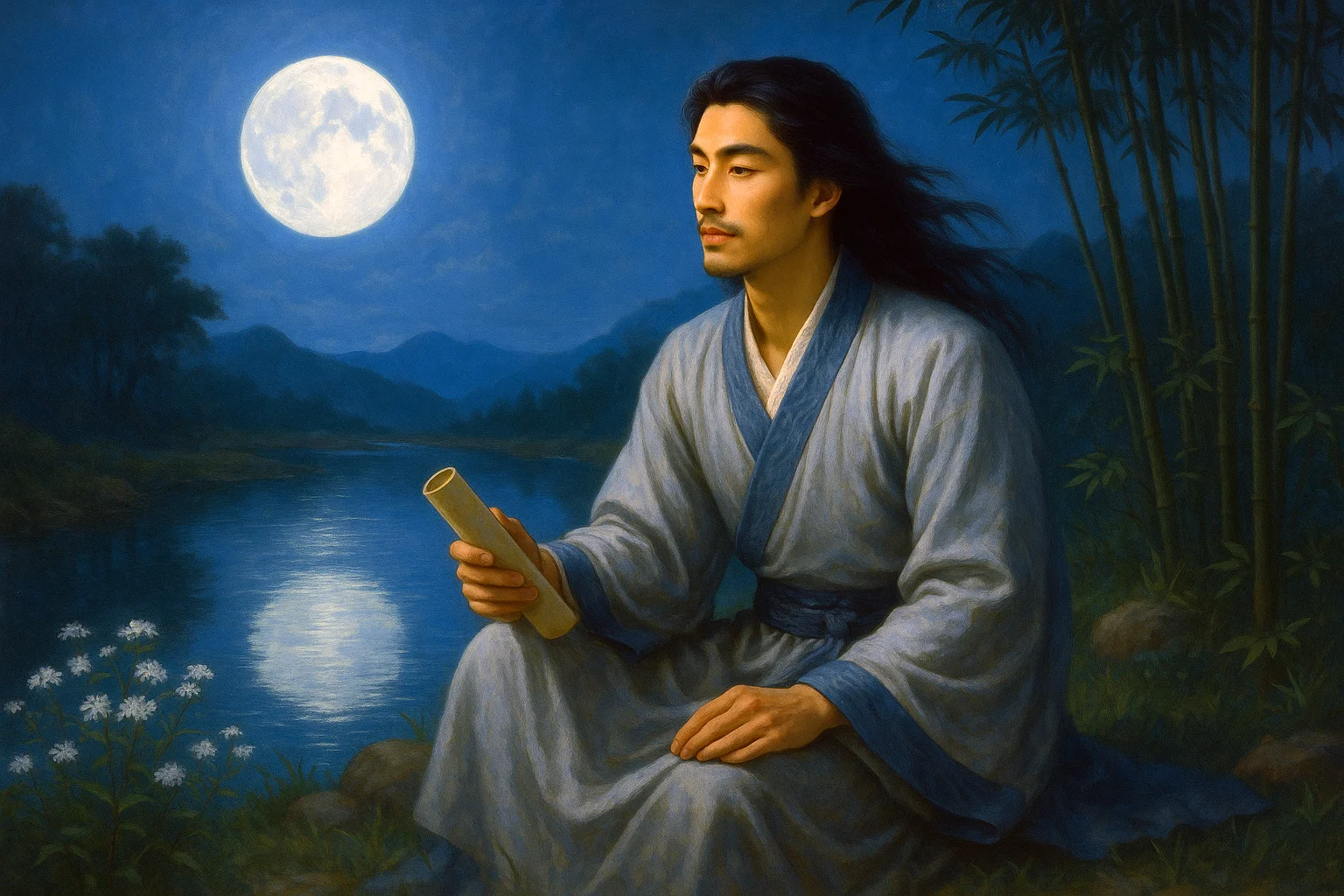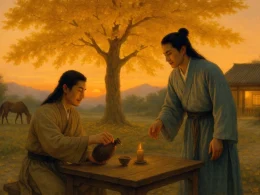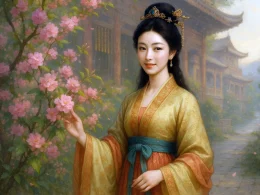Rain spills the pond over its rim,
Through jagged peaks—paths east-west swim.
Peach blossoms' blush-gone without trace,
Only emerald grass fills the space.
Original Poem
「城南二首 · 其一」
曾巩
雨过横塘水满堤,乱山高下路东西。
一番桃李花开尽,惟有青青草色齐。
Interpretation
Composed in 1077 during Zeng Gong's tenure as prefect of Fuzhou, this work captures the coastal southeast's lush springscape after rain. The poem contrasts peonies' fleeting glamour with grass's enduring verdure, embodying Zeng's philosophical stance that values substance over spectacle. Written during an excursion to Fuzhou's southern suburbs, it reflects his signature blend of quiet observation and metaphysical depth.
First Couplet: "雨过横塘水满堤,乱山高下路东西。"
Yǔ guò héng táng shuǐ mǎn dī, luàn shān gāo xià lù dōngxī.
Rainswollen waters lick the pond's stone brim; / wild ridges roll where east-west footpaths skim.
The couplet's hydrological energy ("lick the brim") and topographic dynamism ("wild ridges roll") map nature's post-storm vitality. The "east-west paths" (路东西) symbolize life's divergent possibilities, their crisscrossing mirroring the poet's contemplative wandering.
Second Couplet: "一番桃李花开尽,惟有青青草色齐。"
Yī fān táo lǐ huā kāi jǐn, wéi yǒu qīngqīng cǎo sè qí.
Peach-plum blossoms flare out in vain display; / green grass, unheralded, inherits May.
Here lies Zeng's ecological parable: the showy "peach-plum blossoms" (桃李花), like political favor, blaze briefly, while the "green grass" (青青草) represents enduring virtues—humility, resilience, and quiet growth. The couplet's thermal shift (flaring heat to cool verdure) mirrors the transition from youthful ambition to mature wisdom.
Holistic Appreciation
This poem vividly depicts the natural scenery of the southern suburbs after a spring rain with refreshing clarity, showcasing the poet's wisdom and broad-mindedness in contemplating life through nature. The opening couplet focuses on scenery, establishing a vast and lush natural atmosphere, while the second couplet shifts to lyrical expression, contrasting peach and plum blossoms with green grass to convey profound meaning. This creates a poetic structure that blends the tangible and intangible, movement and stillness.
Written in plain yet profound language, the poem embodies the poet's admiration for a life that is "pure yet unpretentious, tranquil yet resilient." It also reflects his steadfast character—upright, unyielding, and unswayed by superficial glamour.
Artistic Merits
- Scenery as Emotion, Subtle Expression
Rather than stating ideals directly, the poet embeds feelings within natural imagery, allowing emotion to emerge through the transformation of objects. - Philosophy Through Imagery, Unity of Nature and Self
The changing states of nature mirror life’s values and moral choices. The contrast between peach blossoms and green grass forms the core of the poem’s philosophical insight. - Fresh Style, Concise Language
The diction is simple and bright, free from ornate embellishments, yet rich in humanistic sentiment and life wisdom.
Insights
Through its depiction of late spring scenery and its underlying spiritual message, this poem inspires us to embrace a life of simplicity and resilience, like green grass, rather than chasing the fleeting glory of peach and plum blossoms. It reminds us that true value lies not in momentary brilliance but in enduring vitality nurtured in silence.
This celebration of life’s constancy and inner strength reflects the Confucian scholar’s ethos and the intellectual’s unwavering integrity. It also reveals the poet’s profound, dignified, and noble spirit—a world of thought that remains deeply resonant today.
About the Poet

Zeng Gong (曾巩, 1019 - 1083), a native of Nanfeng in Jiangxi province, stands among the illustrious "Eight Great Masters of Tang-Song Prose." His writings distinguished themselves through an elegant classical balance, celebrated for their rigorous argumentation and refined literary craftsmanship. While his poetry embraced an artless subtlety, his prose achieved what critics hailed as "the very essence of purity" - an achievement that, though perhaps less dazzling than his contemporaries like Su Shi or Wang Anshi, earned him posthumous reverence as the founding master of the "Nanfeng Literary School."












